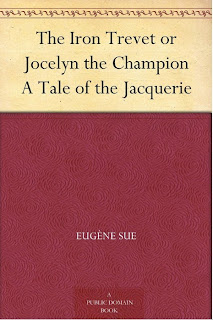The Iron Trevet; or, Jocelyn the Champion; A Tale of the Jacquerie by Eugene Sue
The Iron Trevet is the 13th book of Eugene Sue's 21 volume series The Mysteries of the People; or History of a Proletarian Family Across the Age. The series was created to be a European history that depicts the struggle between the ruling and the ruled classes. One family, the descendants of a Gallic chief named Joel, represent the oppressed and the descendants of a Frankish chief Neroweg, typifies the oppressors. Down through the ages the successive struggles between oppressors and oppressed are depicted as each generation of Joel's family writes the story of their lives and adds it to the collective story gathered so far.
This book is set in the year 1356, a time when feudalism is at its peak and the rights of the lords were never questioned, and their serfs had none. This period is known to us today as the Hundred Years' War, but Eugene Sue presents it from the point of view of the peasants of the countryside and the merchant class of Paris, both struggling for more rights during the unrest of the times. He tells of bravery, boldness and betrayal in a sweeping story that moves between The peasant revolt known as the Jacquerie and the intrigue in Paris between Etienne Marcel and Jean Maillart to create a limited monarchy.
TRANSLATOR'S PREFACE.
Etienne Marcel, John Maillart, William Caillet, Adam the Devil and Charles the Wicked, King of Navarre, are the five leading personages in this story. Their figures and actions, the virtues and foibles of the ones, the vices of the others, the errors of all, are drawn with strict historic accuracy, all the five being historic characters. Seeing the historic importance of the epoch in which they figured, and the types that these five men represent, the story of "The Iron Trevet; or, Jocelyn, the Champion" is more than an historic narrative, it is more than a treatise on the philosophy of history, it is a treatise on human nature, it is a compendium of lessons inestimable to whomsoever his or her good or evil genius throws into the clash of human currents, and to those who, though not themselves participants, still may wish to understand that which they are spectators of and which, some way or other, they are themselves affected by and, some way or other, are bound to either support or resist.
In a way, "The Iron Trevet; or, Jocelyn the Champion" is the uniquest of the series of brilliant stories that the genius of Eugene Sue has enriched the world with under the collective title of "The Mysteries of the People" we can recall no other instance in which so much profound and practical instruction is so skillfully clad in the pleasing drapery of fiction, and one within so small a compass.
To America whose youthful years deprive her of historic perspective, this little story, or rather work, can not but be of service. To that vast English-speaking world at large, now throbbing with the pulse of awakening aspirations, this translation discloses another treasure trove, long and deliberately held closed to it in the wrappage of the foreign tongue in which the original appeared.
DANIEL DE LEON.
New York, April 13, 1904.

No comments:
Post a Comment